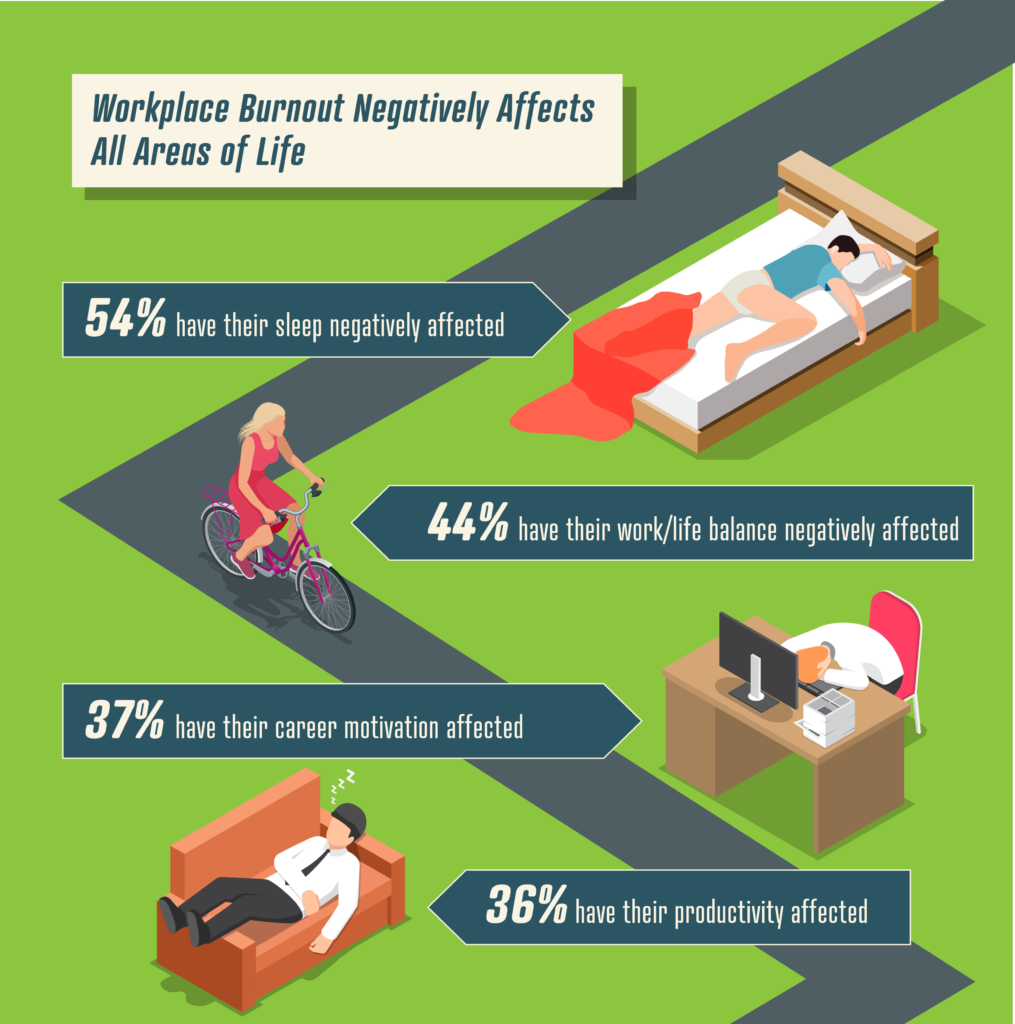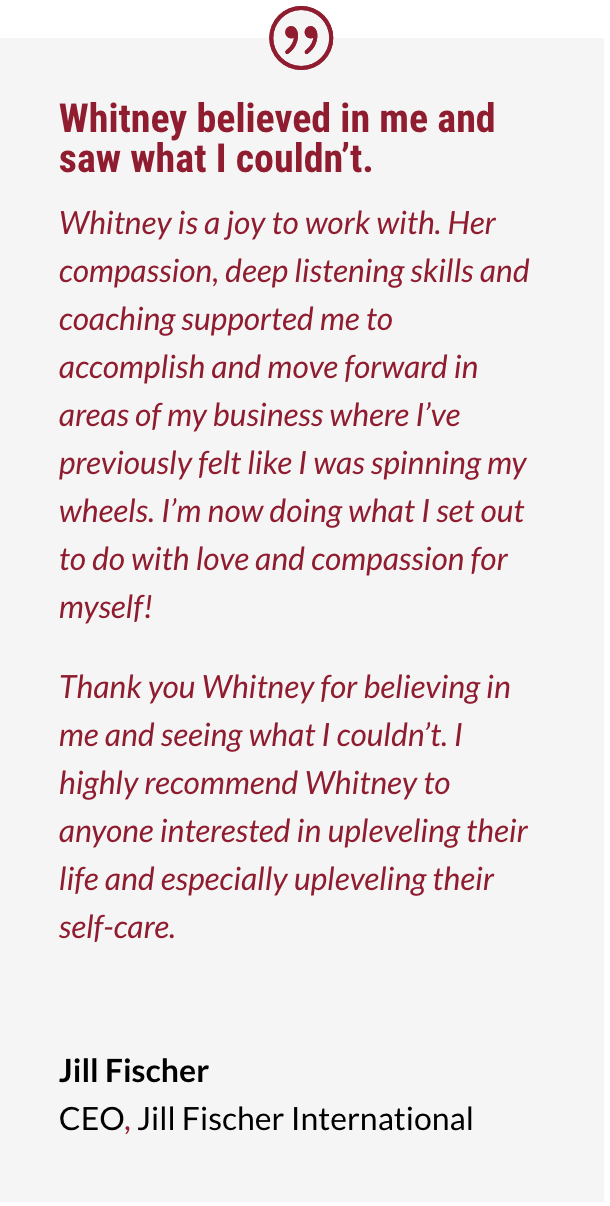Whether you’re an employer or an employee, you’re likely familiar with the signs of burnout.
You feel tension in your shoulders. You can’t focus and read the same email three times. You’re wired on caffeine after a series of restless nights. You’re exhausted and all you want is to feel healthy and energized again.
You aren’t alone. The World Health Organization now recognizes burnout as an occupational phenomenon. This means that a concerning pattern has formed and can no longer be ignored. You, along with countless working women are exhausted, overworked, and anxious for too long without relief.
And this unfortunate phenomenon affects more than the individual — our entire workforce, businesses, and economy are feeling the hazardous effects of occupational burnout. So whether you are an employer or an employee, this is an issue worthy of your attention.
The World Health Organization has now recognized burnout as an occupational phenomenon. How can female professionals recover from occupational burnout? Share on X
An Occupational Phenomenon with Startling Consequences
Living in a hustle culture that encourages you to work, work, work may offer short-term rewards, like money and career advancement, but this behavior can compromise your physical and mental well-being.
“More than half of the American workforce,” according to a study by TollFreeForwarding,” say they are battling stress, fatigue, and frustration every single week, with issues such as exhaustion (44%) and anxiety (40%) not far behind.”
That’s right. More than half of our workforce is experiencing burnout to some degree.
And this data isn’t isolated to a specific profession or industry. Every working woman is at risk of burnout.
Medical professionals struggle with the emotional demands of their patients. Corporate professionals are drained from long hours at the office. Physical laborers suffer exhaustion from the physical demands of their jobs.
And the effects of burnout go beyond individual employees. Its hazardous effects can damage entire businesses and our economy.
When Employees Burn Out, Businesses Suffer
Businesses are similar to machines. For a machine to function, its individual parts need to be in quality condition. For a business to thrive, its employees need to be healthy, mentally sharp, and fulfilled.
So, what happens to a business when its employees are burned out?
Productivity declines because employees are fatigued. Mistakes increase because their focus is blurred. Workplace morale dips because employees are unsatisfied. This negative combination can lead to:
- Revenue loss
- Decreased customer loyalty
- Increased employee absenteeism
- Higher employee turnover rates
When customers are dissatisfied, they take their business elsewhere. When employees are miserable, they polish their resumes and apply to other jobs.
When more than half of the American workforce is burned out, what can we do? How can our workforce escape the clutches of burnout? How can we transition from burnout to balance?
The solution begins with embracing self-care.
Conquer Occupational Burnout by Embracing Self-Care
Burnout awareness and the importance of self-care is gaining media exposure, but we still have yet to see self-care as “standard protocol” within the workplace. To help weave self-care into our professional daily lives, employees and business leaders need to cultivate a culture of self-care.
With the following tips, I’ll be addressing either employers or employees. Both, however, will benefit from applying these changes in the workplace.
#1 Employers, Offer Better Benefits Packages
It’s the individual’s responsibility to practice self-care, but employers can offer benefits packages that encourage employees to lead healthier lives.
For example, some companies offer monthly stipends for their employees to sign up for a gym membership or a specialized fitness center, like yoga or crossfit. If a company has the infrastructure, they can even build an on-site fitness center for employees to use before or after work.
Offering more vacation days is another way to encourage employees to step away from the daily grind and recharge. Many businesses within America offer only two weeks of vacation time, compared to the four weeks offered in European countries.
If we want to get serious about managing burnout, then employees need more time to rest, resharpen their mind, and recover from exhaustion.
#2 Employers, Load Healthy Snacks in Vending Machines
Burnout worsens when your body isn’t supported with nutritious foods. When you regularly consume fruits and vegetables, your body rewards you with increased energy and longevity. And as your health improves, you build more resilience to workplace burnout.
Employers can use this insight by offering nutritious alternatives in office vending machines. Replace the chips and cookies with fruits and yogurt. Remove the sugary drinks and add coffee and tea. Even small changes like this promote a health-minded workplace culture.
#3 Employers, Regularly Communicate With Your Employees
Employees often hesitate when admitting when they’re overworked or burned out. They might fear disappointing their boss or losing their jobs.
Employers can be the first to open a dialogue built on honesty and understanding. Ask questions like:
- What do you need from me?
- Is there anything I can do to support you on this project?
- What can I do differently next time that will help you feel supported?
You might realize that you’re assigning too much to one employee and need to distribute the workload. Or that you need to encourage a burned out team member to take a vacation.
Monthly “check-ins” with your employees will help you gather feedback on how you can improve as a leader and better support your team.
#4 Employers, Encourage Your Team to Take Vacations
Despite the health benefits that vacations offer, many workplaces participate in vacation shaming. Those who take vacations are teased about how they’ll be enjoying their time off while the rest have to work. This can lead to feeling guilt or embarrassment, which discourages employees from taking time off.
As their leader, support your employees when they take a vacation. Assure them that their responsibilities will be covered during their absence. Encourage them to enjoy themselves.
Be direct. Tell your employees that you want them to take vacations. Share how time off can improve their work performance and improve their well-being. To drive this point, send reminders when it’s time for an employee to schedule a vacation.
And don’t forget to take your own vacations. Your team will feel empowered to take time off if they see you, their leader, setting the example.
#5 Employees, Take Your Vacations
America’s hustle and bustle culture might tempt you to leave self-care on the back burner. Women, especially, can feel compelled to outwork their competitors so they can secure a promotion or salary raise. Ambition is healthy and encouraged, but only when balanced with consistent self-care.
If you’re an employee, you can take self-care into your own hands. As you accumulate paid time off, remember to schedule your vacations. Avoid letting your hours roll over into the new year—the longer you delay extended rest and self-care, your risk of burning out increases.
Sometimes, mental health days aren’t enough. You need extended durations of uninterrupted relaxation to feel fully-rested again.
Travel. Read a good book. Catch some sun. And reward yourself with as much quality sleep as possible.
Do you have another way to encourage more self-care in the workplace? Share it in the comments below!
Whitney believed in me and saw what I couldn’t.
Whitney is a joy to work with. Her compassion, deep listening skills and coaching supported me to accomplish and move forward in areas of my business where I’ve previously felt like I was spinning my wheels. I’m now doing what I set out to do with love and compassion for myself!
Thank you Whitney for believing in me and seeing what I couldn’t. I highly recommend Whitney to anyone interested in upleveling their life and especially upleveling their self-care.






